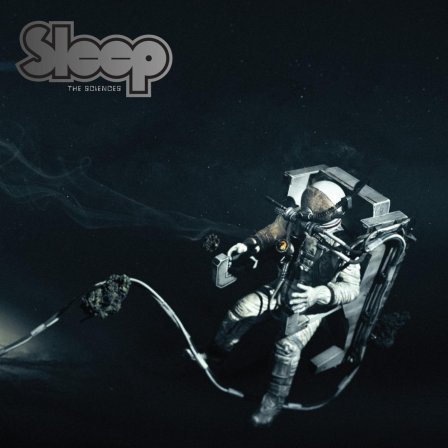[Note: I tried to give this album a 4.20/5, but my editor said it couldn’t be done.]
Following in the footsteps of doom and heavy metal forefathers Black Sabbath, Candlemass, and Saint Vitus, Sleep revitalized doom metal in the early 1990s with Volume One (1991) and Sleep’s Holy Mountain (1992). After touring and having gained some solid critical success, they set their sights on making a third record. Rather than trying to replicate the quick turnaround of Sleep’s Holy Mountain, however, the band decided to do something different: they spent the next four years smoking weed and writing an epic, hour-long song. At the end of that process, Sleep became embroiled in various legal battles, switched labels, and recorded the massive song over the course of one grueling month. As the well-known story goes, their label found the song to be unreleasable, so they cut it up into what would become 1999’s Jerusalem, a version dismissed by the band but accepted as canonical by others, such as Rolling Stone, who called it the 62nd best metal album of all time. After two further edits were released, a new version of the recording was unveiled in 2003 as Dopesmoker, which the band accepted as the closest of the four releases to their vision. Dopesmoker was the one that would, for most fans (including myself), advance into the pantheon of Great Metal Records.
Then, Sleep followed the prophecy laid out by the opening lines of Dopesmoker: they dropped out of life with bong in hand and didn’t release another album for 20 years. And after the decade-long hassle of creating Dopesmoker, who can blame them?
For Sleep, a band obsessed with weed, the fact that April 20 landed on a Friday this year must have been a bat-signal, and they heeded the call, reporting back in November that they’d finished a new album. Weed comes through all over the place in the catalogue of Sleep, a band that basically forced the term “stoner metal” into existence. It’s there in the imagery of Sleep’s Holy Mountain, the lyrics (and very title, duh!) of Dopesmoker, and much of The Sciences, including the album art, where an astronaut — sorry, a Marijuanaut — is smoking weed in outer space. Yet, being high is not integral to understanding or even liking their music.
Weed is often associated with detaching from the world, from society, even from ourselves, and it’s no coincidence that much of the weed imagery of The Sciences is paired with outer space — it’s the ultimate getaway. Sleep’s music aspires toward a particular kind of escapism, one that pairs drug culture with post-minimalism and heavy metal. And for the serious metalhead, the resulting music can, for better or worse, be extremely relaxing. “Sonic Titan” is one massive hook after another, mostly rocking back and forth between two tonal areas. Overall, it’s a fairly repetitive track that requires little from the listener; it could almost be called ambient. So, for the incapacitated metalhead, whether they’re stoned (not me, I’ve retired from that) or exhausted from being on their feet at work all day (me), this music is bliss. Beyond the album’s four hard-hitting, central tunes, The Sciences also sees Sleep reaching a bit outside of the Dopesmoker aesthetic, especially on drone opener “The Sciences” and album closer “The Botanist,” which is a beautiful, dark track that shows Sleep’s “tender” side, one that’s more versatile and sympathetic.
The bliss of listening to Sleep isn’t empty, though. The Sciences is good because, unlike a lot of music influenced by Black Sabbath, it distills the greatest aspects of Sabbath and presses them on into infinity: the huge riffs, the psychedelic backdrops, the wayfaring solos. “The Sciences” is Sleep’s “FX” (from Black Sabbath: Vol. 4). The bong rip at the beginning of “Marijuanaut’s Theme” obviously alludes to the “cough heard ‘round the world” at the beginning of Master of Reality, and the song later references Sabbath guitarist and co-founder Tony Iommi in its lyric, “Sojourns the lone stoned soul/ Marijuanaut loads a new bowl/ Behold as he enters the clearing/ Planet Iommia nearing.” The album also has an entire song dedicated to Sabbath bassist Geezer Butler (“Giza Butler”). Beyond these explicit references, The Sciences captures something essential about Black Sabbath’s doom in a way that feels fresh, its pastiche so overt that it doesn’t really feel pastiche at all. Sleep bet it all on the fact that listeners today basically just want to hear the same thing over and over and over again, especially if those people are metalheads and the music kind of sounds like Black Sabbath. In giving us exactly what we want in The Sciences, Sleep find a way to make the repetitive interesting or at least intoxicating in itself, which is no small feat. Against other contemporary “drug bands” like Phish, Dave Matthews Band, The Flaming Lips, and many EDM DJs, Sleep’s music actually seems to reflect a conscious immersion in the craft, the form, and the history. Or am I just being romantic?
Dropping out of life with bong in hand is not something I want to do, nor does it represent the aspirations of all Sleep fans — it’s just one form of an impulse that we all do share: the impulse to get out of this world, somehow. We may not want to smoke weed in outer space, but we still do want to sit around and listen to repetitive music. The sublimation drive is real — maybe it’s alcohol, maybe it’s video games, maybe it’s an addiction to Instagram and Facebook. At least Sleep are honest about their decision and are committed to seeing it through to its heavy, bong-rippin’ end. And by that standard, they’ve created another masterpiece. But, you know, that’s just, like, my opinion, man.
More about: Sleep




